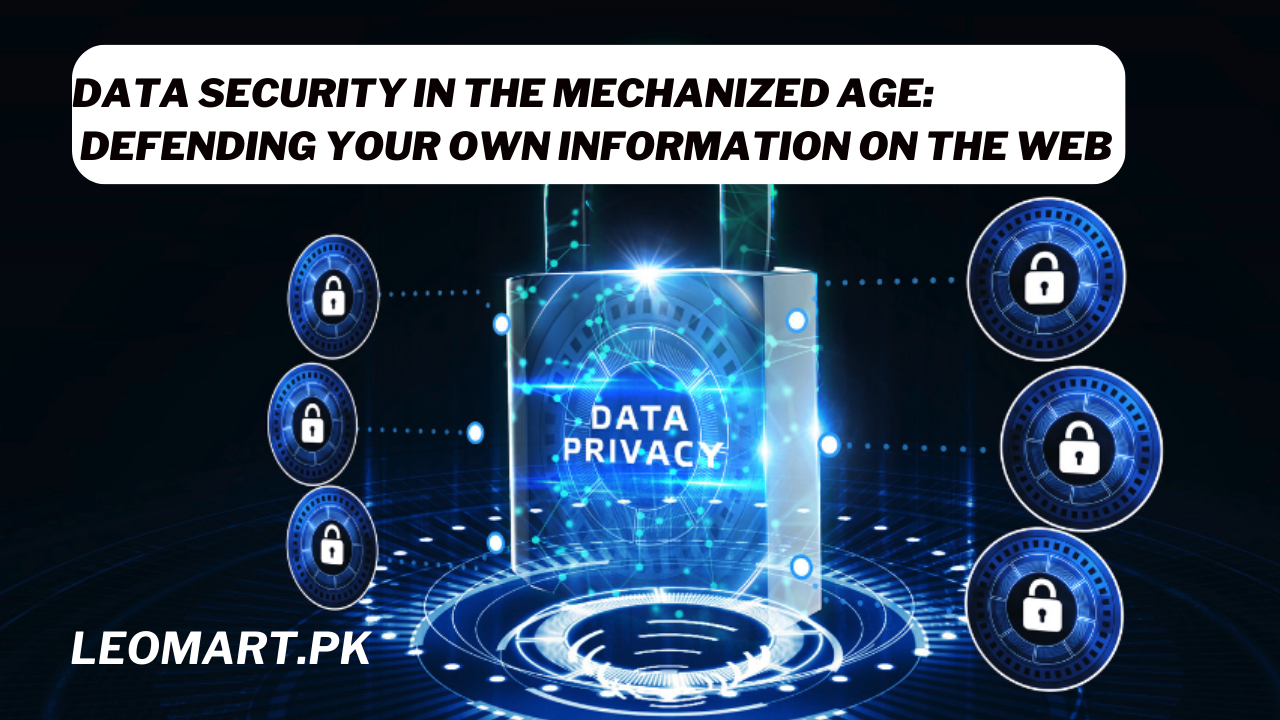Welcome to the advanced age, where our lives are unpredictably interwoven with innovation and the web. From virtual entertainment stages to web based shopping sites, we have become familiar with sharing our own data online without the slightest hesitation. At any point be that as it may, in this time of consistent availability, do you stop to consider what befalls your information once it leaves your fingertips?
Information security is a point that ought to be extremely important to everybody. With digital and information breaks turning out to be progressively pervasive, safeguarding your own data online has never been more significant. In this blog entry, we will investigate what information security implies, dive into the essentials of information assurance regulations, and give you significant hints on the most proficient method to protect your delicate data in a steadily advancing computerized scene.
So snatch some espresso (or tea!) and go along with us as we explore the intricate universe of information security together! Whether you’re an educated individual or somebody who’s simply dunking their toes into the tremendous expanse of the internet, there’s a here thing for everybody. How about we get everything rolling!
What is Information Security?
In this computerized age, information security has turned into a hotly debated issue of conversation. Basically, information security alludes to the assurance and control we have over our own data when it is put away, handled, or sent carefully.
At the point when we discuss individual data, we’re alluding to any information that can be utilized to distinguish a person. This incorporates our names, addresses, telephone numbers, email addresses, government managed retirement numbers – and so on. In the present interconnected existence where nearly everything is done on the web, our own data is continually being gathered and shared by different elements.
Information protection spins around guaranteeing that this data stays secret and secure. It includes laying out decides and guidelines that oversee how associations handle and utilize individual information.
The idea of information security stretches out past safeguarding delicate subtleties like Visa numbers or clinical records. It additionally includes the option to control how our own data is utilized by outsiders, for example, publicists or advertisers who might follow our web-based conduct and inclinations.
With new advancements arising consistently and the rising refinement of digital hiding in the shadows of the internet – from programmers searching for significant information to malevolent entertainers taking a stab at phishing tricks – understanding the significance of information security has never been more vital.
By making strides towards defending your own data on the web, you safeguard yourself from potential fraud as well as state your entitlement to keep up with command over your own computerized impression. So we should investigate a few pragmatic courses through which you can improve your information security pose in this consistently developing computerized scene!
The Rudiments of Information Security Regulations
Information security regulations assume an essential part in protecting our own data in the computerized age. These guidelines are intended to guarantee that people have command over how their information is gathered, utilized, and shared by associations.
One of the crucial standards of information assurance regulations is educated assent. This intends that prior to gathering any private data, associations should acquire clear and express assent from people. This incorporates giving insights concerning what information will be gathered, why it is being gathered, and the way in which it will be utilized.
One more significant part of information assurance regulations is straightforwardness. Associations are expected to give people effectively available security approaches that frame their information dealing with rehearses. These strategies ought to plainly state what kinds of individual data will be gathered, who it will be imparted to, and for what purposes.
As well as acquiring assent and being straightforward about information assortment rehearses, associations are additionally liable for executing proper safety efforts to safeguard the individual data they gather. This incorporates having shields set up to forestall unapproved access or exposure of delicate information.
Besides, under numerous information security regulations like the Overall Information Insurance Guideline (GDPR), people have specific freedoms in regards to their own data. These freedoms incorporate the option to get to their own information, demand remedies assuming mistakes exist, and even solicitation erasure of their data in specific situations.
Rebelliousness with these regulations can bring about serious punishments for associations including weighty fines to notoriety. In this manner, it is fundamental for organizations both of all shapes and sizes to find out more about material regulation and make strides towards consistence.
Overall, data insurance regulations act as a significant structure for safeguarding our own data on the web. The fundamental standards talked about here feature a few vital parts of these regulations, but there might be extra prerequisites relying upon explicit locales. It’s consistently advisable ,to keep awake to-date with current regulations, and counsel legitimate specialists when essential.
This guarantees that both individuals’ and association’s inclinations are respected, and prepares for a more secure computerized climate.
Instructions to Safeguard Your Own Data On the web
Try not to utilize well known phrases or effectively guessable data like birthday events or names. All things being equal, pick a mix of letters (both upper and lowercase), numbers, and exceptional characters.
Moreover, empowering two-factor verification adds an additional layer of safety to your records. This element expects you to give a second type of check, normally through an instant message or email affirmation, prior to accessing delicate information.
Another successful strategy is to be mindful while sharing individual data on the web. Be aware of what you post via web-based entertainment stages and guarantee that main individuals you trust approach this data. Moreover, practice alert while giving subtleties, for example, charge card numbers or government backed retirement numbers on sites – ensure they are secure by checking for “https” in the URL.
Consistently refreshing programming and applications is likewise fundamental in keeping up with online security. Engineers frequently discharge refreshes that incorporate significant security patches intended to safeguard against new things. By staying up with the latest, you limit the gamble of succumbing to cyberattacks.
Using virtual confidential organizations (VPNs) can altogether improve your web-based wellbeing by scrambling web associations and concealing IP addresses from likely programmers or trackers.
By carrying out these precautionary measures into your computerized everyday practice, you can all the more likely shield yourself from unapproved admittance to delicate individual information
Tips for Shrewd Information Use:
- Limit the individual data you share on the web: Be wary about the sort of private data you give via virtual entertainment stages or some other sites. Try not to unveil delicate subtleties, for example, your location, telephone number, or monetary data except if it is totally fundamental.
- Utilize solid and novel passwords: Make solid passwords that are not effectively guessable by utilizing a blend of letters, numbers, and exceptional characters. It is additionally critical to involve various passwords for each web-based record to forestall unapproved access in the event that one secret key gets compromised.
- Empower two-factor validation (2FA): Two-factor confirmation adds an additional layer of safety to your internet based accounts by requiring a second type of check, regularly a code shipped off your cell phone. This decreases the gamble of somebody getting to your records regardless of whether they have acquired your secret phrase.
- Consistently update programming and applications: Keep every one of your gadgets refreshed with the most recent programming variants and patches given by makers or engineers. These updates frequently incorporate significant security fixes that can help safeguard against weaknesses took advantage of by programmers.
- While interfacing with public Wi-Fi organizations, be mindful about sharing delicate information, for example, login accreditations or monetary data since these organizations are frequently unstable and can be effortlessly gotten to by cybercriminals.
- Be aware of phishing assaults: Phishing messages or messages expect to fool people into uncovering their own data through counterfeit sites or vindictive connections/interface s . Continuously twofold browse email shippers’ locations prior to tapping on any connections and try not to give individual subtleties through dubious channels.
Routinely back up significant information : Ensure you consistently back up significant records and archives either on outside hard drives or solid distributed storage stages . In the event of information misfortune due to malware assaults or framework disappointments , having reinforcements will save you from expected migraines .
Be careful with outsider applications consents : While putting in new applications , audit their security strategies cautiously prior to giving them access authorizations . Some applications could demand admittance to superfluous information or capabilities on your gadget , which might actually.
In the present advanced age, information protection is a higher priority than any time in recent memory. With the consistent progressions in innovation and the rising measure of individual data we share on the web, it’s pivotal to comprehend how to safeguard ourselves and our information.
Information security alludes to the control people have over their own data and the way things are gathered, utilized, and shared by associations. It includes finding a way proactive ways to shield delicate information from unapproved access or abuse.
To guarantee your information security on the web, it’s fundamental to find out more about information insurance regulations that oversee your locale. These regulations are intended to control how associations handle individual data and furnish people with freedoms in regards to their own information.
Begin by involving complex passwords for every one of your records and routinely refreshing them. Empower two-factor verification at whatever point conceivable as an additional layer of safety.
Be mindful while sharing individual data via online entertainment stages or sites. Limit how much confidential subtleties you reveal freely, for example, locations or telephone numbers. Survey the security settings on every stage and change them as indicated by your inclinations.
Abstain from tapping on dubious connections from obscure sources as they might contain malware that undermines your information security.
Exploit encryption devices while sending touchy data on the web. Encryption changes over lucid text into a coded design that must be interpreted with a particular key or secret phrase, guaranteeing secure correspondence between parties.
Consistently update all product applications and working frameworks on your gadgets since refreshes frequently incorporate bug fixes and security fixes that address weaknesses programmers might take advantage of.
Instruct yourself about normal phishing procedures utilized by cybercriminals who endeavor to get delicate data through tricky messages or messages professing to be genuine substances like banks or associations. Be wary prior to giving any classified subtleties in light of such demands.





